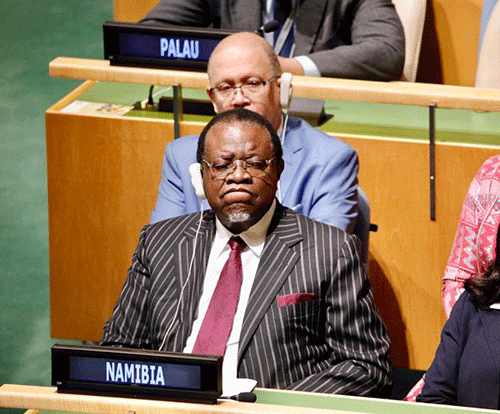President Hage Geingob has once again called for a reform of the United Nations Security Council, saying it should include African countries.
“Africa is a continent of 1.2 billion citizens, and the exclusion of Africa from the Security Council is an injustice. For as long as the council fails to reflect in stature and composition current global realities, it will not be able to adequately address global concerns,” said Geingob.
Geingob made the remarks yesterday at the ongoing 77th session of the United Nations General Assembly (UNGA).
The United Nations Security Council (UNSC) is one of the six principal organs of the United Nations (UN), and it is charged with ensuring international peace and security, recommending the admission of new UN members to the General Assembly and approving any changes to the UN Charter.
Its powers include establishing peacekeeping operations, enacting international sanctions, and authorising military action.
The UNSC is the only UN body with the authority to issue binding resolutions on member states.
The Security Council has the primary responsibility for the maintenance of international peace and security.
It has 15 members, and each member has one vote.
Under the Charter of the United Nations, all member states are obligated to comply with council decisions.
The Security Council takes the lead in determining the existence of a threat to the peace or an act of aggression.
It calls upon the parties to a dispute to settle it by peaceful means and recommends methods of adjustment or terms of a settlement.
In some cases, the Security Council can resort to imposing sanctions or even authorising the use of force to maintain or restore international peace and security.
Geingob also called for the UN to uplift the bans imposed on neighbouring Zimbabwe and Cuba.
“Why are the sanctions in place for a country, which is making progress at all levels? President Emmerson Mnangagwa and the people of Zimbabwe have made laudable progress and reforms, which should be given a chance to succeed without the weight of sanctions,” said the head of state.
He further said Namibia continues to pledge its unwavering solidarity for nations that continue to bear the heavy brunt of sanctions.
On the issue of climate change, Geingob said the planet’s health is in serious jeopardy, as the country has been experiencing unprecedented impacts of climate change, including severe droughts and ravaging field fires.
“Our home is on fire; we are experiencing unprecedented impacts of climate change, including severe droughts and ravaging field fires. Time is a luxury we do not have. We have to act decisively to reduce carbon emissions as our contribution to the preservation of our planet and people,” said Geingob.
Thus, Namibia at COP27 plans to announce major developments in its ambitions to decarbonise global hard-to-abate sectors through the production of green hydrogen.
He said Africa’s first hydrogen-to-power project is expected to be operational by 2024.
In his address, Geingob also touched on the ongoing Russia-Ukraine conflict, calling for a dialogue that will result in a peaceful resolution.
He said the UN was created for the maintenance of peace and security, and it should lead to a peaceful resolution in the Russia-Ukraine conflict.
– mamakali@nepc.com.na
Caption: (Geingob)Photo: File


